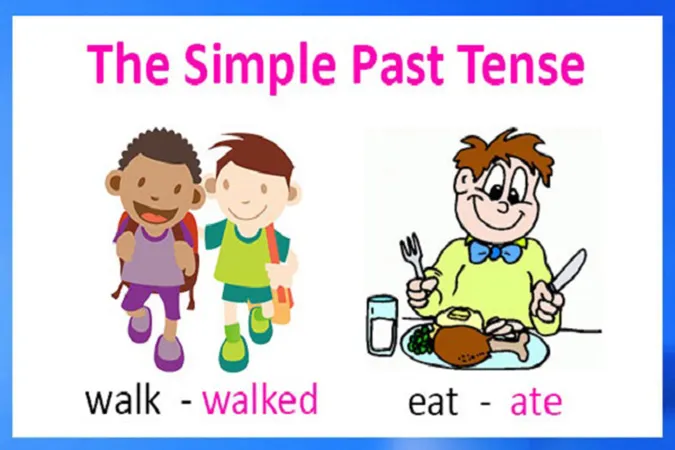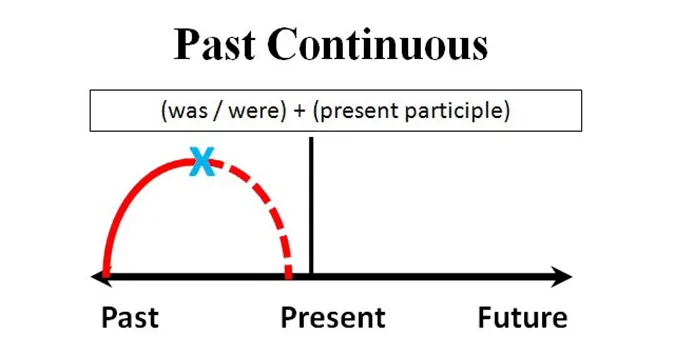Thì quá khứ đơn và thì quá khứ tiếp diễn tuy là hai thì cơ bản nhưng rất quan trọng và không thể thiếu trong việc ứng dụng vào nghe nói và cả ngữ pháp.
1. The past simple tense (Thì quá khứ đơn)
1.1 Cấu trúc (Form)
| Affirmative (Khẳng định) | Negative (Phủ định) | Interrogative (Nghi vấn) |
| S + V(past) (+ O) | S + did not/ didn't + V(bare- inf) (+ O) | Did + S +V(bare-inf) (+ O)? |
| They went to the cinema last night. | They didn't go to the cinema last night. | Did they go to the cinema last night? |
1.2. Cách dùng (Use)
Diễn tả hành động đã xảy ra và kết thúc tại một thời điểm trong quá khứ (finished actions or events)

Ex:
I saw him at the airport yesterday. (Hôm qua tôi đã nhìn thấy anh ấy ở sân bay.)
My aunt sent me a letter two days ago. (Cách đây 2 ngày cô tôi đã gửi thư cho tôi.)
Diễn tả hành động lặp đi lặp lại trong quá khứ (repeated actions)
Ex:
I played soccer three times a week when I was at school. (Lúc tôi còn đi học thì tôi đã chơi bóng đá 3 lần một lần.)
She went to Paris twice last year. (Năm ngoái cô ấy đến Pari 2 lần.)
Diễn tả thói quen trong quá khứ (past habits)
Ex:
She visited her parents every Sunday. (Vào mỗi chủ nhật thì cô ấy đã đến thăm bố mẹ.)
We often went swimming every afternoon. (Vào mỗi buổi chiều thì chúng tôi đã thường đi bơi.)
Diễn tả tình trạng hay tình huống trong quá khứ
Did you have a car when you were young? (Có phải bạn có ô tô khi bạn còn trẻ không?)
Diễn tả một chuỗi hành động xảy ra liên tiếp nhau trong quá khứ (sequences of actions)
Ex:
He ran to the car, jumped in and raced off into the night.
1.3. Các cụm từ thời gian (Time phrases)
Một số cụm từ thời gian được dùng trong thì quá khứ đơn: yesterday, last night/week/month/year, etc., two days/ weeks/months, etc. ago, in 2000, at that moment, then, suddenly, when.
2. The past continuous tense (Thì quá khứ tiếp diễn)
2.1. Cấu trúc (Form)
|
Affirmative (Khẳng định) |
Negative (Phủ định) | Interrogative (Nghi vấn) |
| S + was/ were + V-ing (+O) | S + was/ were + not + V-ing (+O) | Was/Were + S +V-ing (+O)? |
| My brother was reading books at this time last night. | My brother wasn't reading books at this time last night. |
Was your brother reading books at this time last night? |
2.2 Cách dùng (Use)
Diễn tả hành động đang diễn ra tại một thời điểm cụ thể trong quá khứ (actions in progress at a point of time in the past).

Ex:
At 9 o'clock yesterday, I was doing the homework. (Vào lúc 9 giờ hôm qua tôi đang làm bài tập về nhà.)
Diễn tả hành động đang diễn ra trong một khoảng thời gian trong quá khứ (actions in progress over a period of time).
Ex:
My husband was working hard all day. (Chồng tôi đã làm việc vất vả suốt cả ngày.)
Note: Các cụm từ thời gian như all day, all the morning,... thường được dùng trong trường hợp này
Diễn tả tình huống/ sự việc tạm thời hoặc đang thay đổi trong quá khứ (temporary or changing situations in the past).
Ex:
At the time, I was working for a bank in this city. (a temporary situation)
I was becoming bored with the job, so I decided to change. (a changing situation)
Diễn tả một hành động đang diễn ra thì một hành động khác xen vào trong quá khứ (an action was in progress when another action happened/ interrupted it).
Ex:
We were having dinner when someone knocked at/on the door.
(Chúng tôi đang ăn tối thì có ai đó đã gõ cửa.)
Diễn tả hai hay nhiều hành động xảy ra song song cùng một lúc trong quá khứ (two or more actions in progress at the same time in the past)
Ex:
While I was cooking dinner, my husband was playing computer games.
(Trong khi tôi đang nấu bữa tối thì chồng tôi đang chơi điện tử.)
- Diễn tả hành động lặp lại nhiều lần trong quá khứ gây ra sự khó chịu, bực mình (mang nghĩa tiêu cực). Cách dùng này thường đi kèm với trạng từ "always/ constantly".
Ex:
The old man was always complaining about the noise in the area.
Note: Chúng ta không thường dùng thì quá khứ tiếp diễn với các động từ chỉ tình trạng, cảm xúc, sở hữu, tri giác như: be, cost, belong, own, have, feel, hear, hate, like,...
2.3. Các cụm từ chỉ thời gian (Time phrases)
Các cụm từ thời gian thường được dùng trong thì này như: while, as, when, meanwhile, at that time, all the morning/ afternoon/ day, etc.
3. Bài tập vận dụng cơ bản
Bài 1: Write the words in the correct order.
1. I/ the bus/ caught/ yesterday/ to work/.
2. it was raining/because/ didn't/ she/ for a walk/ go/.
3. I got/TV/ when/ watching/ my/ brother/ was/ home/.
4. break/your arm/you/how/did/?
5. last summer/ in a beautiful village/ spent/ we/.
6. last night/ Sally/ what/ was/ wearing/ at the party/?
7. a loud party/ while/ my neighbors/I/ were having/ to study,/ was trying/.
8. you/ to the cinema/ last night/ did/ go/?
Bài 2: Choose the correct answer in the bracket.
1. Last night I _______ on my thesis and it took me a while to realise that my phone was ringing. (work/ was working)
2. When you _______ I was in a meeting so I couldn't answer your call. (called/ were calling)
3. David can never agree with Tim. They _______. (always argue/ are always arguing)
4. Why did you disagree with me at the meeting? _______ to make me look incompetent? (Did you try/Were you trying)
5. Daisy _______ the buffet while I was seeing to the drinks. (prepared/ was preparing)
6. Tim _______ home when the accident happened. (walked/ was walking)
7. I _______ to work, even when it rained. (was always walking/ always walked)
8. Kelly _______ her speech when I walked in. (was finishing/ finished)
Bài 3: Put the verbs into the past simple or past continuous tense.
1. I used my time well while I (wait) _______ for the train - I wrote some emails.
2. I (not/work) _______ when my boss walked in my office. I was on Facebook.
3. I saw a car crash when I (wait) _______ for the taxi.
4. Tom (have) _______ long hair and a beard when he was at university.
5. It started raining while I (drive) _______ to work.
6. What (you/do) _______ this time last year?
7. I (not/call) _______ you at 10 o'clock as arranged because I was having a meeting.
8. I (stiIl/sleep) _______ when my husband left for work this morning.
KEY
Bài 1:
1. I caught the bus to work yesterday.
2. She didn't go for a walk because it was raining.
3. My brother was watching TV when I got home.
4. How did you break your arm?
5. We spent last summer in a beautiful village.
6. What was Sally wearing at the party last night?
7. While I was trying to study, my neighbors were having a loud party.
8. Did you go to the cinema last night?
Bài 2:
1. was workin
2. called
3. are always arguing
4. Were you trying
5. was preparing
6. was walking
7. always walked
8. was finishing
Bài 3:
1. was waiting
2. wasn't working
3. was waiting
4. had
5. was driving
6. were you doing
7. didn't call
8. was still sleeping
-----------------------------------
Hy vọng bài viết và các bài tập trên sẽ giúp các em có thể hiểu được thì quá khứ đơn và thì quá khứ tiếp diễn và có thể phân biệt được giữa hai thì này.
Người biên soạn:
Giáo viên: Lê Thị Mỹ Hà
Trường THCS và THPT Nguyễn Khuyến



